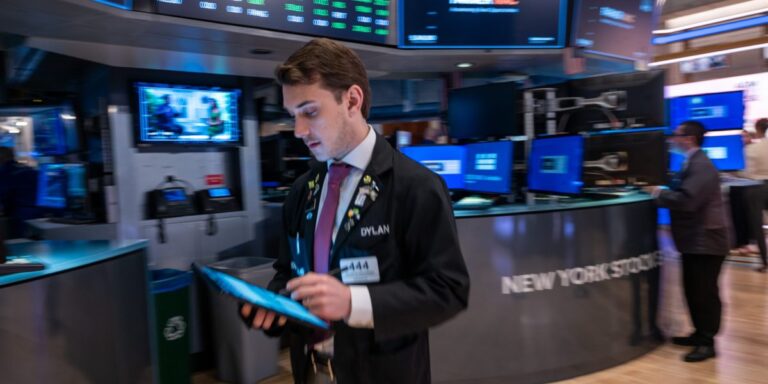
THE Dow The Jones Industrial Average surpassed the 40,000 level for the first time on Thursday, as U.S. stocks drifted around their record highs set the day before.
The Dow rose 69 points, or 0.2%, to 39,967, in afternoon trading. It topped 40,000 points earlier in trading, making its last 10,000-point jump in about three and a half years as the U.S. economy and corporate profits emerged from the crash caused by COVID-19. They have continued to hold on so far despite the worst inflation in decades, the punishing effects of high interest rates and concerns about a recession that seemed inevitable but has not yet arrived.
The S&P 500 index, which is much more closely followed on Wall Street and dictates the performance of many more 401(k) accounts than the Dow, was up 0.1% as of 1:22 p.m. Eastern Time. THE Nasdaq the composite was down 0.1%. They reached historic highs on Wednesday.
Walmart was one of the most powerful forces driving the market higher, and it rose 6.5% after yielding a greater profit for the last quarter than expected by analysts. It also said its revenue for the year could exceed the forecast range it previously gave.
Walmart’s strength could be an encouraging signal for the economy as a whole. Concerns are growing about the ability of U.S. households to cope with continued high inflation, even if not as bad as before, and costlier credit card payments. especially those with lower incomes.
Targetwhich reports quarterly results next week, rose following Walmart’s report, alongside other retailers like Dollar General And Dollar Tree. Each added at least 2.9%.
Chub climbed 4.2% after Warren Buffett’s Berkshire Hathaway Revealed she had acquired a stake in the insurer.
Better-than-expected results were a key reason U.S. stock indexes hit record highs in May, following a difficult April. Another hope has been rekindled that the Federal Reserve will be able to cut its main interest rate at least once or twice this year. The Fed is keeping its federal funds rate at the highest level in more than two decades.
A series of worse than expected inflation reports earlier in the year had jeopardized the potential for such reductions, but some more encouraging data has since arrived.
Treasury yields eased in May as hopes grew that the economy could reach the hoped-for sweet spot, where it cools enough from high interest rates to quell inflation, but not to the point of causing a serious recession. Yields were up slightly on Thursday following mixed economic data.
A report showed a little more workers filed for unemployment Last week, profits exceeded those expected by economists, although the number remains small compared to history. Others said homebuilders started fewer projects last month than expected, manufacturing growth in the Mid-Atlantic region was weaker than expected and import prices rose. more than planned.
“Today’s numbers were consistent with the general theme of the week – nothing dramatic, but showing signs of a cooling economy,” said Chris Larkin, managing director of trade and investment at E- Trade of Morgan Stanley.
The 10-year Treasury yield rose from 4.35% to 4.37% Wednesday evening. The two-year yield, which moves more closely with expectations of Fed action, rose to 4.78% from 4.72%.
On the losing side of Wall Street, Deere fell 4% despite a higher-than-expected profit for its latest quarter. He reduced its profit forecast for the entire fiscal year, below analysts’ estimates as farmers buy fewer tractors and other equipment.
Homebuilders fell following a weaker-than-expected housing starts report. They gave back some of their big gains from the day before, when hopes of falling mortgage rates had pushed them sharply higher. Lennar fell 2.1%, and Dr. Horton slipped 2.5%.
Stoppage of play and AMC Entertainment slipped for a second straight day, moving further away from their a stunning start to the week. They reacted more to investor enthusiasm than to any change in their financial outlook.
GameStop fell 20.72%, although it is still up almost 80% for the week so far. AMC Entertainment lost 10%.
Under protection oscillated between losses and gains after warning that its revenue would likely be down “by a low double-digit percentage rate” in the next financial year, citing weaker demand from wholesalers and “inconsistent execution in all of our activity. The company announced a restructuring plan aimed at cutting costs and also announced a share buyback program of up to $500 million. It was down 0.6%.
In foreign stock markets, indexes were slightly down in much of Europe after rising mainly in Asia. Hong Kong’s Hang Seng jumped 1.6% after reopening after a public holiday, while Japan’s Nikkei 225 rose 1.4%.


